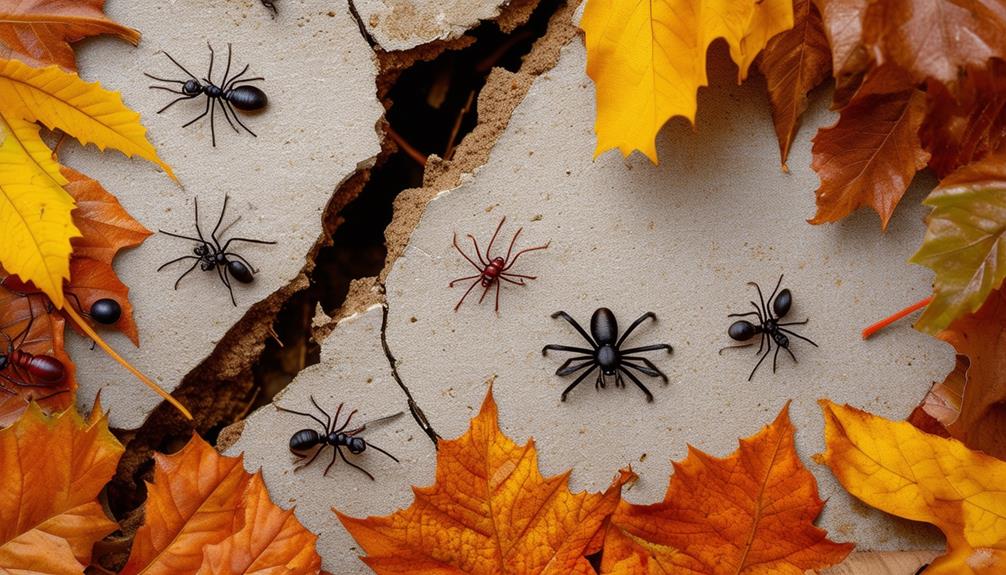What is the best homemade bug spray?
Creating your own bug spray at home is a great way to protect yourself and your family from pesky insects. Not only are these homemade bug sprays effective, but they are also safe and free from harsh chemicals. Here are some of the best homemade bug spray options:
-
Essential oil bug spray: Essential oils like citronella, lavender, eucalyptus, and lemongrass are known for their insect-repellent properties. By combining a few drops of these oils with a carrier liquid like witch hazel or apple cider vinegar, you can create a powerful bug spray. Simply mix the ingredients in a spray bottle and apply it to your skin before heading outdoors.
-
Garlic bug spray: Garlic has natural insect-repellent properties and can be used to make a homemade bug spray. Crush a few garlic cloves and mix them with water. Let the mixture sit overnight, then strain it into a spray bottle. This garlic bug spray can be used on plants and around your outdoor living areas to keep bugs away.
-
Neem oil bug spray: Neem oil is a natural insecticide that can help repel a wide range of bugs. Mix a few teaspoons of neem oil with water and a small amount of liquid soap. Shake the mixture well and spray it onto your skin or plants to keep bugs at bay.
Using homemade bug spray is not only effective but also provides a safer alternative to chemical-laden sprays. Remember to reapply the bug spray every few hours, especially if you’re sweating or swimming. Additionally, consider wearing long sleeves and pants, and avoiding peak mosquito activity times to further protect yourself from bug bites.
In addition to homemade bug spray, there are other natural bug repellent methods you can try. Planting insect-repellent herbs like basil, mint, and rosemary in your garden can help deter bugs. Burning citronella candles or torches can also create a bug-free zone in your outdoor space.
By using these homemade bug spray options and natural bug repellent methods, you can enjoy bug-free adventures while minimizing your exposure to harmful chemicals. Say goodbye to annoying bug bites and hello to a more natural and eco-friendly solution! So, go ahead and take control of your outdoor experience with these effective homemade bug sprays.
Key Takeaways
- Essential oils such as citronella, lavender, eucalyptus, and lemongrass can be used to create homemade bug sprays.
- Natural ingredients like garlic, neem oil, apple cider vinegar, and witch hazel are effective in repelling bugs.
- Reapply bug spray every few hours, wear protective clothing, and avoid peak mosquito activity times for maximum effectiveness.
- Combining different essential oils like peppermint and eucalyptus or apple cider vinegar and lemon can create powerful bug sprays.
Essential Oils for Bug Repellent
Essential oils are a great option for creating your own bug repellent spray at home. When it comes to homemade bug spray alternatives, essential oils have been proven to be effective in repelling bugs.
Certain essential oils such as citronella, lemongrass, and peppermint contain natural compounds that insects find unpleasant, deterring them from coming near. Research has shown that these essential oils can effectively repel mosquitoes, flies, and other common insects.
Citronella oil, for example, has been found to be as effective as some chemical-based repellents in repelling mosquitoes. Lemongrass oil has also shown promising results in repelling insects, especially mosquitoes. Peppermint oil, known for its refreshing scent, is not only a natural bug deterrent but also has antimicrobial properties.
To create your homemade bug spray, mix a few drops of these essential oils with a carrier oil such as coconut oil or witch hazel. Apply it to exposed skin areas and clothing to keep bugs at bay. Remember to reapply every few hours for maximum effectiveness.
Natural Ingredients for Bug Spray
When making homemade bug spray, there are several natural ingredients that can be effective in repelling bugs.
Apple cider vinegar, witch hazel, lemon juice, and neem oil are all commonly used ingredients due to their insect-repellent properties.
Apple cider vinegar and lemon juice contain compounds that bugs find unpleasant, while witch hazel acts as a mild astringent and neem oil contains natural insecticidal properties.
Apple Cider Vinegar
To effectively repel bugs, you can’t go wrong with using apple cider vinegar. It’ll have those pesky critters running for the hills!
Apple cider vinegar is a natural ingredient that has been used for centuries due to its many benefits. It contains acetic acid, which is known to repel insects such as mosquitoes, flies, and ants.
To make your homemade bug spray, you’ll need to mix apple cider vinegar with water in the right ratio. A common recommendation is to mix one part apple cider vinegar with one part water. This ratio ensures that the spray is strong enough to repel bugs, while still being safe for use on the skin.
So, next time you’re looking for a natural bug repellent, give apple cider vinegar a try. Your skin and the bugs will thank you!
Witch Hazel
Using witch hazel is a fantastic way to naturally repel insects and enjoy bug-free outdoor activities. Witch hazel is a plant-based extract that has been used for centuries due to its numerous benefits. When it comes to bug spray, witch hazel is a popular ingredient because of its natural insect-repellent properties. It contains tannins that help to tighten the skin and pores, making it difficult for insects to penetrate. Additionally, witch hazel has anti-inflammatory properties, which can help soothe insect bites and reduce itching.
Here is a table highlighting the benefits and uses of witch hazel:
| Benefits | Uses |
|---|---|
| Natural repellent | Bug spray |
| Tightens skin | Skin toner |
| Anti-inflammatory | Soothing insect bites |
| Reduces itching | After-shave |
| Calms irritation | Soothing sunburns |
By incorporating witch hazel into your homemade bug spray, you can effectively repel insects while also benefiting from its soothing and calming properties. Enjoy your bug-free outdoor adventures with this natural and versatile ingredient.
Lemon Juice
Get ready to add a refreshing twist to your insect-repelling routine with the zesty power of lemon juice.
When it comes to DIY bug spray alternatives, lemon juice has gained popularity for its effectiveness. Lemon juice contains citric acid, which acts as a natural repellent for insects. This powerful ingredient has been proven to repel mosquitoes and other bugs, making it an excellent choice for those seeking a homemade bug spray that actually works.
Not only does lemon juice repel insects, but it also provides a refreshing scent that can help mask the unpleasant odors associated with bug repellents.
To create your own lemon juice bug spray, simply mix equal parts lemon juice and water in a spray bottle and apply it to your skin or clothing.
Enjoy the outdoors bug-free with this natural and effective bug spray alternative.
Neem Oil
Experience the incredible power of neem oil and say goodbye to those pesky insects once and for all! Neem oil, derived from the neem tree, has been used for centuries as a natural insect repellent. It is highly effective in repelling a wide range of insects, including mosquitoes, fleas, ticks, and ants.
Neem oil contains compounds that disrupt the feeding and reproductive systems of insects, making it a powerful deterrent. It is also safe for humans, pets, and the environment, making it an ideal choice for those looking for a natural alternative to chemical bug sprays.
Here is a comparison between neem oil and some popular alternatives in a table format:
| Neem Oil | DEET |
|---|---|
| Effective | Effective |
| Natural | Synthetic |
| Safe | Toxic |
| Environment-friendly | Harmful |
In conclusion, neem oil offers numerous benefits as a homemade bug spray. Its effectiveness, safety, and eco-friendliness make it a top choice for those seeking a natural alternative to protect themselves and their loved ones from pesky insects.
DIY Bug Spray Recipes
If you’re looking for a natural bug spray that is effective at repelling insects, you might want to consider trying some DIY recipes. Two popular options are lavender and citronella bug spray. These have been shown to repel mosquitoes and other bugs.
Another option is peppermint and eucalyptus bug spray. This not only effectively repels insects but also has a refreshing scent.
Additionally, apple cider vinegar and lemon bug spray can be an effective natural repellent. Both ingredients have properties that bugs find unpleasant.
Finally, neem oil and witch hazel bug spray is another option to consider. Neem oil has insecticidal properties, and witch hazel can help soothe bug bites.
Lavender and Citronella Bug Spray
Combining lavender and citronella creates the perfect homemade bug spray. Both lavender and citronella have been proven to be effective alternatives to commercial bug sprays. Lavender contains compounds like linalool and linalyl acetate, which have insect-repelling properties. Citronella, on the other hand, contains citronellal and geraniol, which are known to repel mosquitoes and other insects.
A study conducted by the Journal of Insect Science found that lavender and citronella bug sprays were effective in repelling mosquitoes for up to 2 hours. Another study published in the Journal of Environmental Science and Health found that a combination of lavender and citronella oil provided protection against a broad range of insects, including mosquitoes, ticks, and flies.
Here is a table that compares the effectiveness of lavender and citronella bug spray:
| Bug Spray | Effectiveness against Mosquitoes | Effectiveness against Ticks | Effectiveness against Flies |
|---|---|---|---|
| Lavender | High | Moderate | Moderate |
| Citronella | High | Moderate | High |
| Lavender + Citronella | High | High | High |
By using a homemade bug spray made with lavender and citronella, you can protect yourself and your loved ones from pesky bugs while avoiding the potentially harmful chemicals found in commercial bug sprays.
Peppermint and Eucalyptus Bug Spray
To enhance your protection against insects, try incorporating the refreshing scents of peppermint and eucalyptus into your DIY bug repellent.
Peppermint oil, derived from the peppermint plant, has been used for centuries for its numerous benefits. It contains a compound called menthol, which has insect-repelling properties. Not only does peppermint oil help keep bugs away, but it also has a pleasant aroma that can mask the scent of humans, making it harder for insects to detect us.
Eucalyptus oil, extracted from eucalyptus leaves, is another effective ingredient for bug repellents. It contains a natural compound called cineole, which is known to repel mosquitoes and other insects. Additionally, eucalyptus oil has antimicrobial properties that can help protect against bacterial and fungal infections.
When combining peppermint and eucalyptus oils, you create a powerful bug spray that not only keeps insects at bay but also provides a refreshing scent.
So, next time you’re making your own bug repellent, don’t forget to include these beneficial oils for added protection.
Apple Cider Vinegar and Lemon Bug Spray
When it comes to keeping those pesky bugs away, you’ll be amazed at how apple cider vinegar and lemon can work wonders. Apple cider vinegar, with its strong odor, acts as a repellent for insects such as flies, mosquitoes, and ants. The high acidity of apple cider vinegar disrupts their sense of smell, making them less likely to approach. Lemon, on the other hand, contains a compound called limonene, which is known to repel pests effectively. By combining these two ingredients, you can create an all-natural bug spray that is both effective and long-lasting.
| Apple Cider Vinegar and Lemon Bug Spray | |
|---|---|
| Ingredients | Instructions |
| —————————————- | |
| Apple Cider Vinegar | 1. Mix equal parts of apple cider |
| Lemon juice | vinegar and lemon juice. |
| Spray bottle | 2. Pour the mixture into a spray |
| bottle. | |
| 3. Spray the solution generously | |
| around areas prone to bugs. |
By using this apple cider vinegar and lemon bug spray, you can protect yourself and your loved ones from annoying pests while enjoying the outdoors. It’s a natural, cost-effective alternative that ensures effectiveness and longevity.
Neem Oil and Witch Hazel Bug Spray
For a truly effective and natural solution to keep those pesky bugs at bay, you’ll be amazed at how neem oil and witch hazel work wonders.
Neem oil is derived from the seeds of the neem tree and has been used for centuries as a natural insect repellent. It contains compounds that disrupt the life cycle of insects, preventing them from reproducing and causing harm.
Witch hazel, on the other hand, is a plant extract that has astringent properties and is known for its soothing effect on the skin. When combined with neem oil, witch hazel acts as a carrier, allowing the oil to spread evenly and adhere to the skin.
The benefits of using natural bug repellents like neem oil and witch hazel are twofold. Firstly, they are safer for both humans and the environment, as they don’t contain harmful chemicals. Secondly, they are effective in repelling a wide range of bugs, including mosquitoes, ticks, and flies.
So, next time you’re looking for a homemade bug spray, give neem oil and witch hazel a try for a natural and effective solution.
Tips for Using Homemade Bug Spray
When using homemade bug spray, there are a few key tips to keep in mind.
- First, always apply the spray before going outside to ensure maximum protection.
- Second, remember to reapply as needed, especially if you are sweating or in a heavily infested area.
- Lastly, avoid contact with your eyes and mouth to prevent any irritation or ingestion of the spray.
To maintain the effectiveness of the spray, store it in a cool, dark place to avoid degradation of the ingredients.
Apply Before Going Outside
To effectively protect yourself from bugs, apply this homemade bug spray before heading outside. By doing so, you can enjoy the benefits of pre-application, which include reducing the risk of bug bites and potential allergic reactions. Additionally, using alternative bug deterrents in your homemade spray can provide an extra layer of protection against a variety of insects. Consider incorporating ingredients such as citronella oil, lavender oil, and peppermint oil, which are known for their bug-repellent properties. These oils have been shown to be effective against mosquitoes, flies, and other pests. Furthermore, incorporating a 2-column and 5-row table can visually represent different ideas for alternative bug deterrents to include in your homemade bug spray:
| Alternative Bug Deterrents | Benefits |
|---|---|
| Citronella oil | Repels mosquitoes and flies |
| Lavender oil | Deters mosquitoes and moths |
| Peppermint oil | Repels ants and spiders |
| Eucalyptus oil | Deters ticks and fleas |
| Tea tree oil | Repels mosquitoes and ticks |
By using this homemade bug spray and applying it before going outside, you can effectively protect yourself from pesky bugs and enjoy your time outdoors.
Reapply as Needed
To keep those pesky insects away, make sure you reapply your bug repellent regularly. The frequency of reapplication depends on various factors, including the type of repellent, insect activity, and environmental conditions. Generally, it’s recommended to reapply every two hours or after swimming or excessive sweating. However, if you notice more insect bites or a decrease in effectiveness, it’s crucial to reapply immediately.
Evaluating the effectiveness of your bug spray is essential in determining the appropriate reapplication frequency. Look for signs such as the number of insect bites, duration of protection, and user reviews. Remember, consistent reapplication is key to ensuring continuous protection from bothersome bugs.
Avoid Contact with Eyes and Mouth
Be sure to avoid getting bug repellent in your eyes or mouth, as it can cause irritation and discomfort. When using homemade bug sprays, it’s important to be aware of the potential side effects and take precautions to protect sensitive areas.
Bug repellents often contain ingredients such as essential oils, vinegar, or lemon juice, which can cause irritation if they come into contact with the eyes or mouth. If accidental contact occurs, immediately rinse the affected area with plenty of water and seek medical attention if symptoms persist.
To further protect yourself, consider using alternative bug repellents that are specifically designed for use around the face, such as citronella-based products or bug repellent wristbands. These options provide effective protection while minimizing the risk of irritation to the eyes and mouth.
Remember, prevention is key when it comes to insect bites, so always read and follow the instructions on the product label.
Store in a Cool, Dark Place
Ensure that you store your bug repellent in a cool, dark place to maintain its effectiveness and prolong its shelf life. Storing homemade bug spray properly is crucial for maximizing its potency and ensuring it remains safe to use. Exposure to light and heat can degrade the active ingredients in the spray, rendering it less effective against bugs. By storing it in a cool, dark place, you can protect the spray from these damaging factors and extend its shelf life.
To further emphasize the importance of proper storage, consider the following table:
| Storage Conditions | Shelf Life |
|---|---|
| Cool and dark | 6-12 months |
| Warm and bright | 3-6 months |
| Hot and exposed | 1-3 months |
As you can see, storing homemade bug spray in a cool, dark place can significantly increase its shelf life, ensuring you have a reliable repellent when you need it most. So, make sure to find a suitable spot away from direct sunlight and heat sources for optimal storage.
Benefits of Homemade Bug Spray
To effectively repel insects, try using a homemade bug spray. It offers the benefits of being all-natural and cost-effective.
Homemade bug spray recipes have gained popularity due to their effectiveness in keeping bugs at bay. These sprays often contain essential oils such as citronella, eucalyptus, and peppermint. These oils are known for their insect-repelling properties.
Research has shown that these natural ingredients can be just as effective as synthetic insecticides. They are also without the potential risks associated with chemical-based sprays.
Additionally, making your own bug spray allows you to customize the scent and potency to suit your preferences.
By using homemade bug spray, you not only protect yourself and your family from pesky bugs but also avoid harmful chemicals found in commercial products.
So why spend money on expensive and potentially harmful insecticides when you can make your own effective, all-natural bug spray at home?
Other Natural Bug Repellent Methods
Another effective way to repel insects naturally is by using essential oils. These oils are derived from natural bug repellent plants such as citronella, lemongrass, and lavender. Citronella oil, for example, has been found to be effective against mosquitoes and other biting insects. Lemongrass oil also acts as a natural bug repellent, particularly against mosquitoes. Lavender oil has been shown to repel ticks and fleas.
In addition to essential oils, there are alternative bug repellent methods you can try. One option is to plant natural bug repellent plants in your garden or around your home. Some examples include marigolds, basil, and catnip. These plants naturally release scents that repel insects.
Another method is to use fans to create airflow, as mosquitoes and other insects are not strong flyers and can be deterred by a breeze.
Finally, wearing light-colored clothing and avoiding heavily scented products can also help to reduce insect attraction.
Conclusion and Final Thoughts
In conclusion, it is clear that there are a variety of natural methods available to repel insects. These methods range from using essential oils derived from bug repellent plants to the strategic use of fans and the cultivation of insect-repelling plants in our surroundings.
When it comes to the best homemade bug spray, DIY alternatives can be quite effective. Homemade bug sprays typically utilize ingredients like vinegar, essential oils (such as citronella, lemongrass, and lavender), and water. These ingredients have been found to repel insects effectively and are safe for use.
The benefits of using homemade bug spray include avoiding harmful chemicals found in commercial sprays, saving money, and having more control over the ingredients used. However, it is important to note that homemade bug sprays may need to be reapplied more frequently compared to commercial options.
Overall, DIY bug spray alternatives provide a natural and cost-effective solution for repelling insects and protecting yourself and your loved ones.
Frequently Asked Questions
Can I use essential oils for bug repellent on my pets?
Yes, you can use certain essential oils as a natural bug repellent for your pets. Some safe options include lavender, citronella, and peppermint. However, always dilute the oils and do a patch test first to ensure your pet’s safety.
Are there any natural ingredients that are harmful to the environment?
When looking for eco-friendly alternatives to bug sprays, it’s important to consider the harmful effects of certain natural ingredients on the environment. Be cautious of ingredients like neem oil and garlic, as they can have negative ecological impacts.
How long does homemade bug spray typically last before it expires?
Homemade bug spray typically lasts for about 2-4 weeks before it expires. After that, its effectiveness may decrease. Using expired bug spray may not effectively repel bugs, so it’s best to make fresh batches regularly.
Can I use homemade bug spray on children and babies?
When using homemade bug spray on children and babies, there are potential risks and precautions to consider. It’s important to ensure the ingredients are safe and non-toxic, and to consult with a healthcare professional before use.
Are there any precautions I should take when using homemade bug spray on plants?
To protect your plants from pests naturally, take precautions when using homemade bug spray. Avoid spraying during the hottest part of the day, target specific pests, and test the spray on a small area first.





